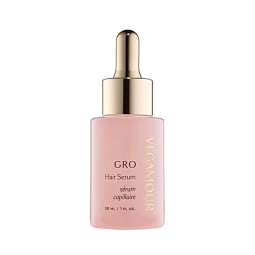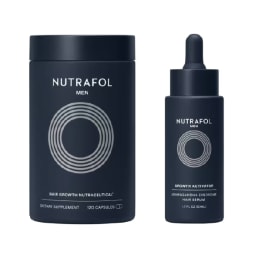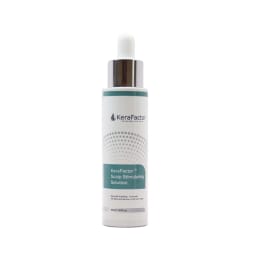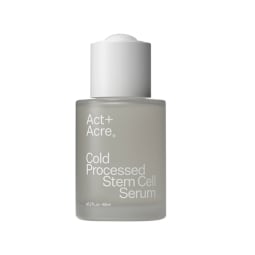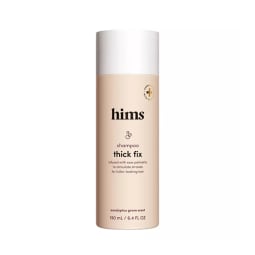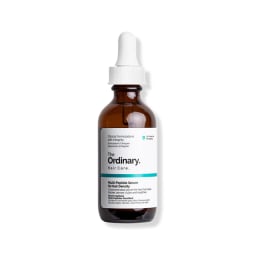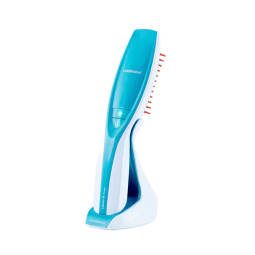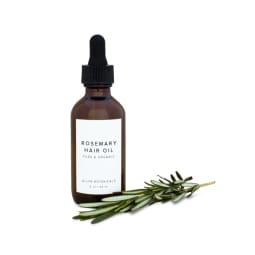That being said, not all forms of hair loss are permanent either—especially if you actively treat the scalp to encourage regrowth. Hair loss in women and men is alike in many ways and different in some. Here, the difference between the two and what derms want you to know about treating and preventing hair loss. Women tend to have more subtle thinning throughout the scalp, characterized by a widened part or more visibility of the scalp, Miller explains. The most common cause of hair loss in both men and women is androgenetic alopecia. This kind of hair loss is usually caused by, “Genetic changes in certain hormones that lead to thinning of the hair,” Miller says. However, traumatic events or increased stress and autoimmune conditions can also lead to hair loss. This kind of shedding isn’t instantaneous. “When high stress occurs, the hair begins to shed about three to six months later,” board-certified Christine Shaver, M.D., FAAD, of Bernstein Medical Center for Hair Restoration in New York City once told mbg. It’s important to know what the root of your hair loss is in order to treat it best. If your hair loss is hormonal, then oral medication may be a good addition to a topical hair growth regimen. Regardless, scalp care is essential, and these products are A+ for a happy, healthy scalp. What users say: This serum has a serious following from people of all genders because it’s highly effective. (And no matter how you identify, we all want effective products, no?) Here’s what one reviewer said: “I have had a fair amount of hair loss, I lost about half of my hair due to vitamin deficiencies, anemia, stress, and overall lack of protein in my diet. I lost around half of my hair in the span of like a month or two. And I promise this stuff is the one product I found that actually works. I didn’t want to use minoxidil, that was kind of going to be my last resort. But once I started using this product my hair stopped falling out, and started to grow back, and honestly grows faster than before.” What users say: Not only do men rave about this product (“My hair was making me feel older than I was before Nutrafol,” says one 46-year-old), but clinical studies back it up: 85% of users saw improved hair health using the serum after 30 days, and 84% of users saw improved hair growth with using the supplement after 6 months. What users say: This high-tech formula has caught the eye of many. Here’s what one user said: “I have been using Kerafactor Scalp Stimulating spray and shampoo for three months and have noticed increased hair fullness in the balding section of my scalp and an associated thickening of my hair generally. It is a remarkable new product that is simple to use and shows incredible immediate results.” What users say: Not only do people use this to calm irritated scalps, but users notice healthy hair growth with continued use: “My hair seems to be growing out thicker and darker at the roots with the first bottle. I will continue using!” What users say: This shampoo may be a wash-off product, but the innovative ingredients still put in the work. One reviewer says: “After a few days my hair looked noticeably thicker. It even worked on my beard, which is nice because my beard does not grow in as thick and full as I’d want it to.” What users say: While it may leave a noticeable residue for some, most folks rave about how full their hair grows in: “There is visible growth with just one bottle. There are new hairs coming in,” says one. Another notes: “Within a month of using this serum I have noticed so many new hairs. It’s worth every penny.” What users say: While using LED light for hair growth is still a new concept for people, there’s good research to support it’s use (which can justify the price tag). As one person wrote: “I’ve been using the HairMax Ultima 9 for 2 weeks and I’ve already noticed changes! Significantly less hair falling out in my brush, my clothes and my shower.” What users say: This simple formula brings the results—as hundreds of reviewers have noted. One says the regrowth is noticeable: “I’m not usually one to write a review but i was truly surprised by the results of this mighty bottle. I looked in the mirror yesterday and realized i have new hair growth and significantly less shedding. I’d recommend this to anyone who wants less shedding, more growth, and overall healthier hair!” Here’s what to look for to narrow down your search: A notable fan of the oil is triple board-certified dermatologist Mamina Turegano, M.D. who’s previously said she advises patients to mix a few drops of the oil into the shampoo right before applying, then let the concoction sit on the scalp for a few minutes before rinsing. For a more potent treatment, make a scalp oil blend that uses rosemary oil along with a carrier oil (like sunflower or jojoba oil) and let it sit on the scalp for several hours before rinsing out. If DIY isn’t your route, you’ll find rosemary oil in countless hair care products. And while the results were promising and it did encourage growth, we’d like to note that the oil did not outperform minoxidil. As Turegano said, “What [researchers] saw was that both the pumpkin seed oil and the minoxidil increased hair regrowth and hair thickness, but the minoxidil 5% did outperform the pumpkin seed oil. Regardless, pumpkin seed oil has a ton of nutrients." Especially if you’re prone to a dry and flaky scalp, oils might be a better choice to truly lock in moisture. Again, you can use scalp oils overnight to avoid greasy-looking roots during the day. For example, a recent study found that the peptide APN5 peptide was able to reduce hair loss. And some research suggests that copper peptides can improve hair growth2. Other peptides—like Palmitoyl Tetrapeptide-7—are thought to reduce inflammation3, therefore potentially reducing shedding. As far as antioxidants or hair are concerned, Vitamin E is the most notable for hair. When used topically can actually help balance the oils you have naturally4, help reduce inflammation in the skin5, and can condition the follicle4. But beyond that, eating a robust diet with hair-supporting vitamins and nutrients can help feed your body what it needs for hair growth. We’ve outlined several of the most research-backed options here, which can serve as your guide. To level up, even more, add a hair supplement to your daily routine. There are plenty of different formulas, from biotin to collagen and beyond. Some of them come in capsules, while others are in powder form and rich in protein. Check out this breakdown to learn more. Pick something that can fit into your lifestyle so you can stick with it. When it comes to hair growth, consistency is key. But often, and for many men, professional intervention is needed. Always consult with your medicine practitioner, dermatologist, or hair care specialist about what route might be best for you, but here are some of the most common:










